Managers dissatisfied with salary-setting appraisals at Lund University
In October 2024, Saco-S at Lund University sent out a survey to all salary-setting managers who are members of a Saco-S union. The survey results show that more than half of the academic managers are dissatisfied with the salary-setting process. Only 33% consider salary-setting appraisals to be useful for justifying individual salary. Here is a short summary of the results and Saco-S will publish the full report shortly.
Of the 365 members in salary-setting positions who received the survey, 101 responded. In the survey to all members, we have previously observed that employees do not want to have salary-setting appraisals. Regardless of what kind of process shortcomings employees perceive, the free text responses made it clear that they are not satisfied with the current process and a very large number of them indicated that they would prefer the union to negotiate or that a tariff system be introduced.
Today's salary-setting appraisals create frustration and disappointment in a number of ways. This result is not surprising for Saco-S as we answer many member questions on salary-setting. Nevertheless, the number of critical free text responses was overwhelming and the next step was therefore to ask salary-setting managers what they think of the method. Despite Saco-S's objections, the employer Lund University decided in 2014 to introduce salary-setting appraisals after the local veto on salary-setting appraisals disappeared from the central agreement in RALS 2010-t. Today, when we ask the employer at central level what they think about salary-setting appraisals, they see no reason to change the model. It is therefore particularly interesting what our members who are salary-setting managers think about the current salary-setting model. The survey had the same structure as the one sent out to all members, but the questions were adjusted to capture managers' views on the usefulness of the salary-setting method as a tool for the employer. In addition, questions were asked about managers' satisfaction with the method.
Results and preliminary conclusions
In principle, there were as many administrative managers as academic managers who responded.
Managers generally find the staff appraisal useful in clarifying expectations of the employee for future follow-up. Both managers and employees appreciate the staff appraisal and it seems to be held widely across the organisation. When it comes to the follow-up, this was the most obvious process deficiency when all members were asked in the first survey. We could link the shortcoming in this process step to the subsequent failure of the salary-setting managers to justify the salary increase based on the salary-setting factors and the focus of the staff appraisal. Therefore, it is interesting to note that the managers' perception of the usefulness of the follow-up in assessing employees' performance is quite high.
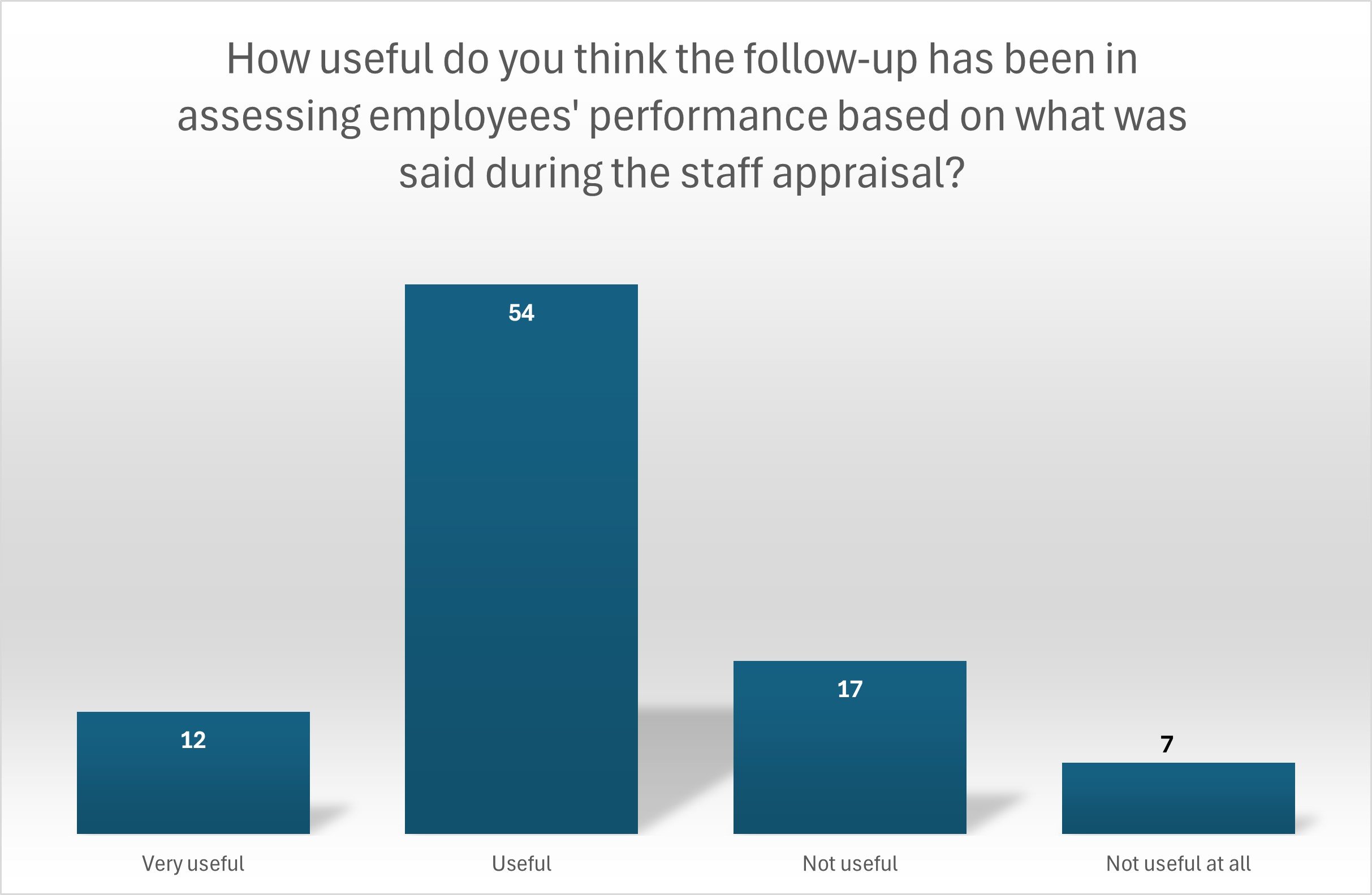
A clear majority of salary-setting managers respond that the follow-up is very useful and helpful. This is in contrast to the fact that the employee survey showed that 1/3 of the members did not feel that they had a follow-up with their salary-setting manager.
However, when we compare academic and administrative managers' views on usability, there is a statistically significant difference. Significantly more administrative managers find the follow-up useful or very useful (80% of administrative managers compared to 60% of academic managers). There are also fewer managers overall who find the follow-up useful compared to the staff appraisal and this pattern is reinforced by the answers to the question on the last step, the salary-setting appraisal. When we ask about the usefulness of the salary-setting appraisal in justifying the individual salary for the employee, the picture is quite split. When we divide it into academic and administrative managers, the difference in the view of usefulness is strikingly large.
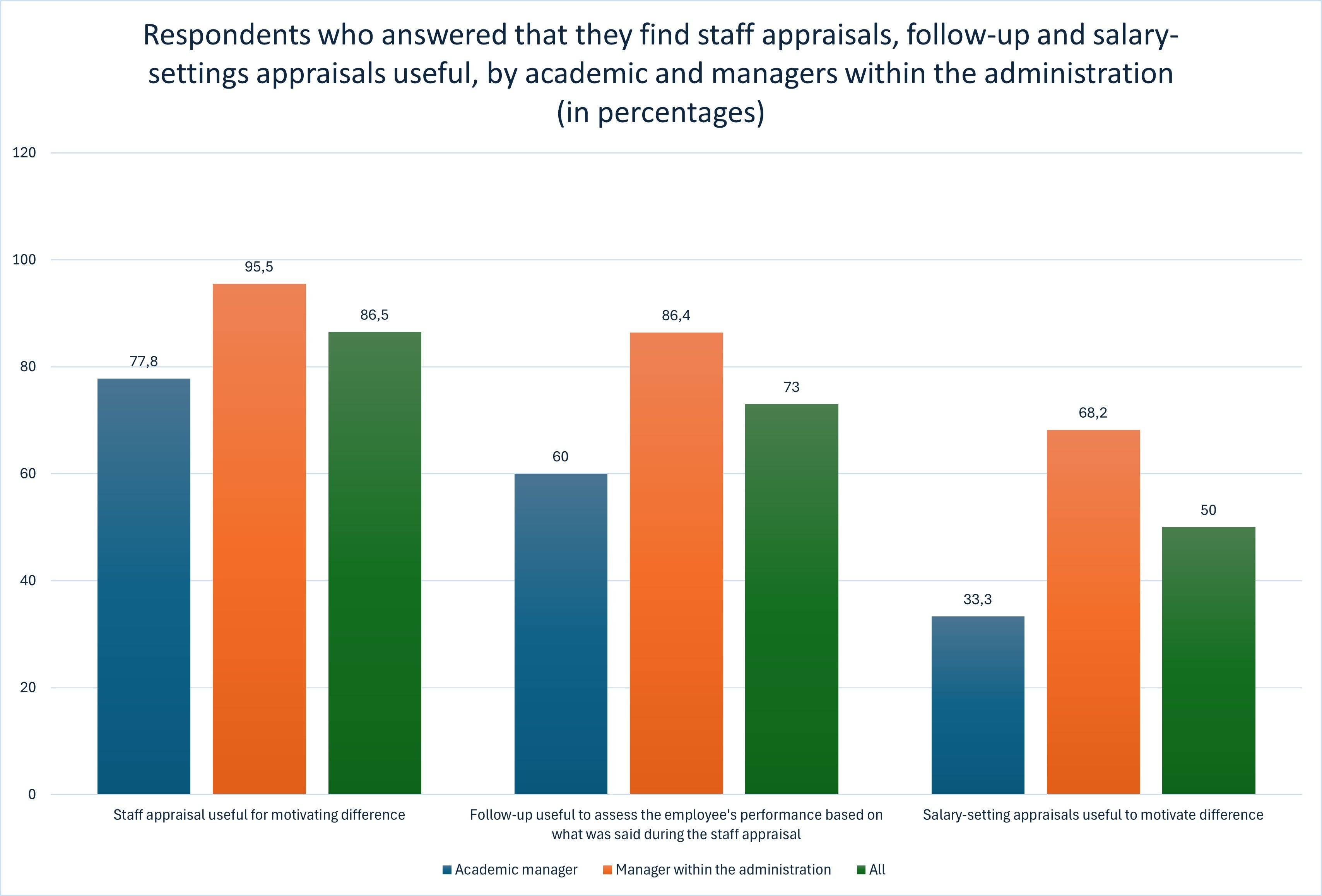
The results show that the difference between academic and administrative managers' views on the usefulness of the process increases during the process from staff appraisal to follow-up and finally salary-setting appraisals. Among academic managers, only 33% consider the salary-setting appraisals to be useful for justifying differences in individual salaries of different members. Moreover, only half of all managers consider it useful. It should not be forgotten that salary-setting managers who have completed the three steps have the full power to set salary for all our members, and yet they do not find the salary-setting appraisals useful. We will return in the full report to an in-depth discussion of this based on the managers' free text responses.
Satisfaction
When we asked all members in the member survey “How satisfied are you with the handling of the salary review in your workplace?” the answer was that there were more satisfied than dissatisfied. This was surprising as members, as employees, reported major shortcomings in the process and clearly wished for a different method of salary-setting. We interpreted this contradictory result to mean that members are satisfied that the agreement is not fully respected. Now, when we asked in the managers' survey “How satisfied are you with the salary review process?” it turns out that they are more dissatisfied than employees. As above, we have divided the results into academic managers and administrative managers.
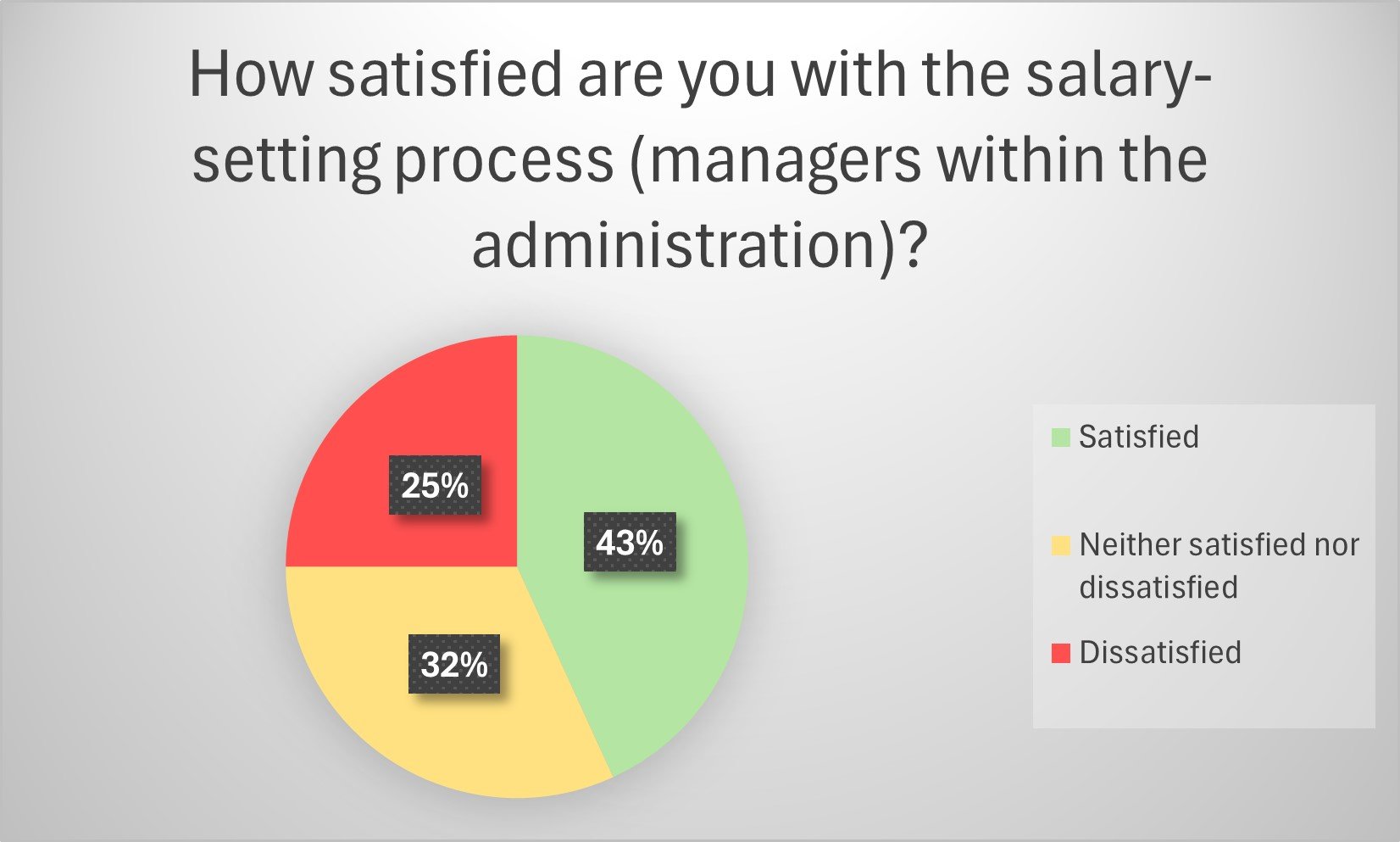
Of the administrative managers, less than half are satisfied with the current salary setting process. 25% are directly dissatisfied and one third are neither satisfied nor dissatisfied. Whether this result is good or bad depends on who you ask, but the employer tends to say that they are satisfied with salary-setting appraisals at Lund University. When it comes to the satisfaction of academic managers, the picture becomes much worse.
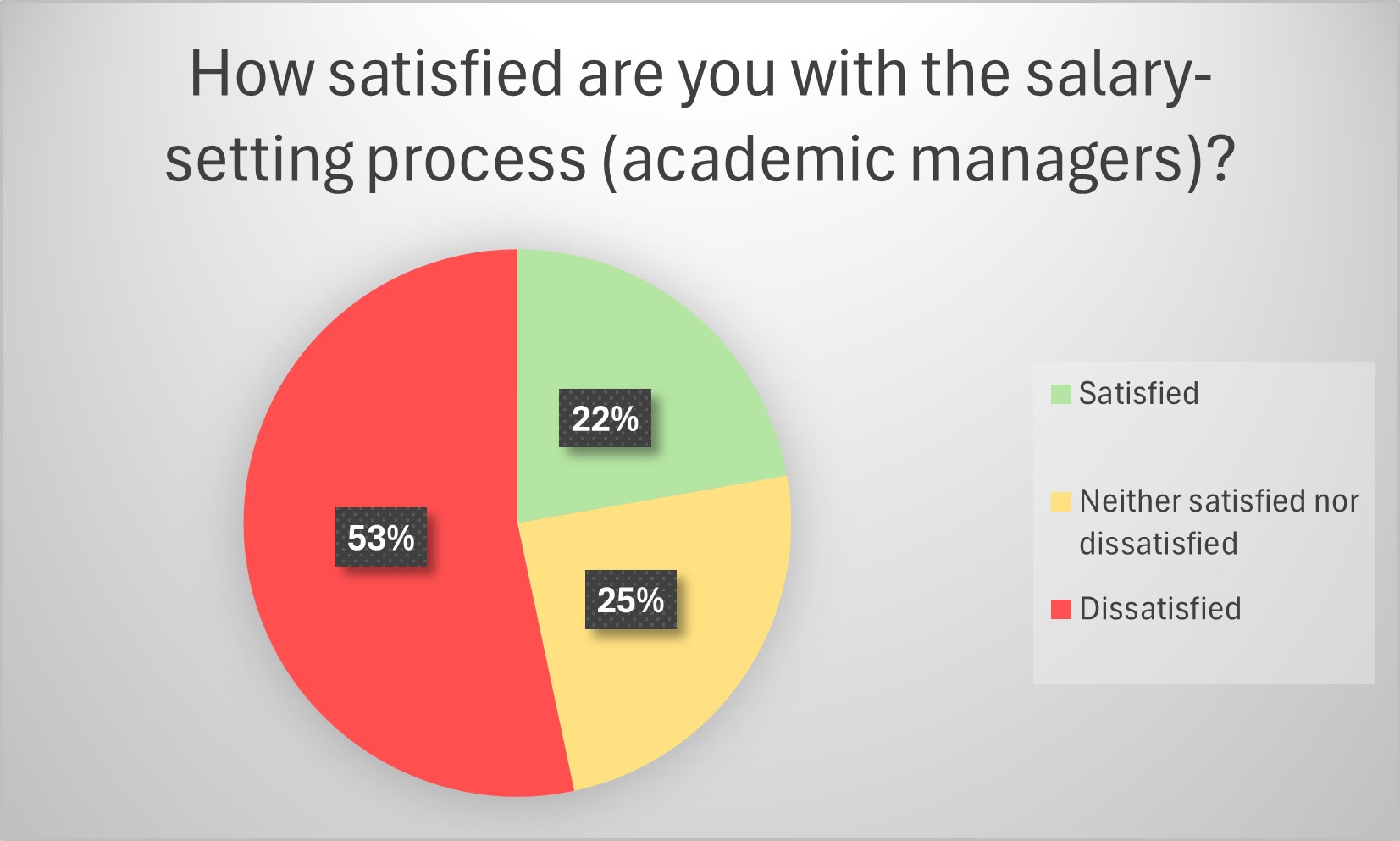
This shows that more than half (53%) of collegially elected academic managers are dissatisfied with the salary-setting process, while 25% are neither satisfied nor dissatisfied with the process, and only 22% are satisfied. Academic managers are collegially elected managers of core businesses in the faculties. In the survey of all members, many felt sorry that managers were forced to undertake a process that takes so much time and delivers so little. We therefore asked how managers would like the salary-setting process to be done if there were no salary-setting appraisals.
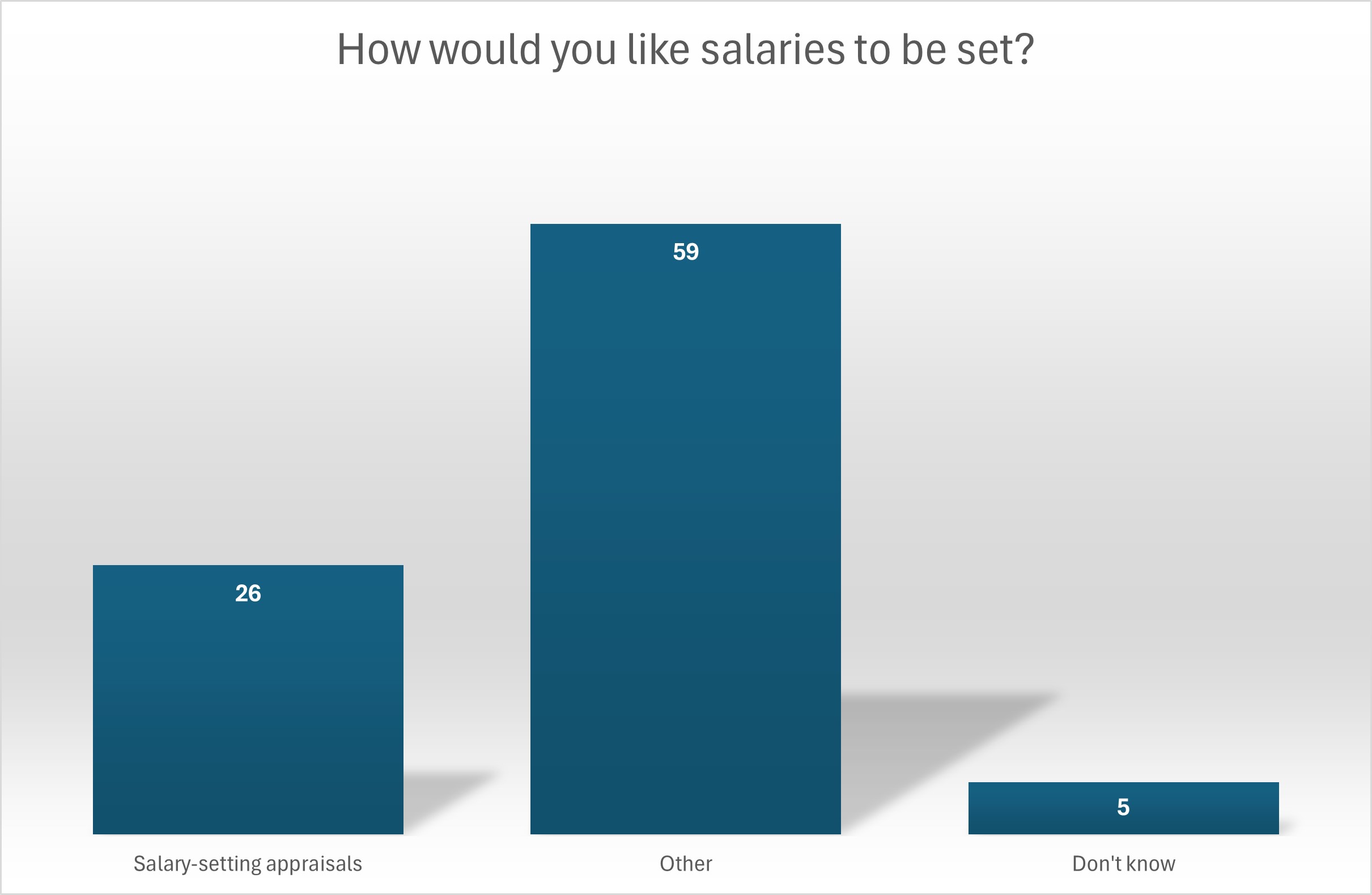
We note that 59 out of 90 respondents said that they wanted something other than salary-setting appraisals. We have not yet analyzed the free text responses and will return with the conclusions in the report that will be published on our website. Even now, however, we dare to state that employees' dissatisfaction with salary-setting appraisals is surpassed by managers' dissatisfaction. Saco-S's conclusion from the two surveys is that we have a salary-setting model that is better suited to the administration than to the core business, but no one seems to be particularly satisfied. Please read the article in Universitetsläran (in Swedish) about the survey that was sent to all members to also read the employer's statement on the results.